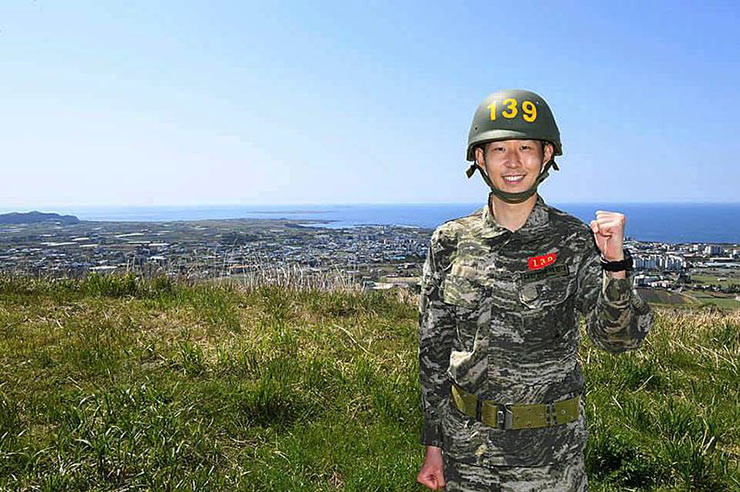A Grammy for BTS might have done more than just underscoring the group’s achievements to the world: it might have exempted them from the military.
Sweeping changes are expected in South Korea following the election of conservative strongman Yoon Suk-yeol as President.
One of these changes is the return of the mandatory military service to 24 months, a promise Yoon had made during his election campaign. Yoon’s predecessor, current outgoing president Moon Jae-in (whose term is set to end on May 10) had shortened the country’s required conscription to 18 months.
Compulsory service has existed in South Korea since 1957, a few years after the temporary peace agreement between South Korea and North Korea was signed. The provisional nature of the armistice in both countries (who are technically still at war) means that a functioning military in South Korea must always be available in the event anything might transpire.
READ MORE: Military Men We Miss
All able-bodied Korean men are required to enlist from the age of 18 onwards, although some choose to delay. The latest age for delaying is 28, after which they are declared as military evaders. This status is considered dishonorable, and has actively ruined careers in the country.
Currently, there are two types of military service in the country: active-duty and non-active personnel. Active duty soldiers serve in the Army or Marine Corps (one year and six months), the Navy (one year and eight months) and the Air Force (one year and nine months).
At the end of the service, they are placed on the reserve roster and must attend three days of annual training every year for five years.
Non-active duty personnel are those who, for health reasons, are cut from the mark of making the active-duty roster. They are required to work as public service workers for one year and nine months at locations that need supplementary staff (local community centers, city halls, government agencies, etc).
Soft power
Why is this important for the rest of the world to know? Well, it directly impacts BTS. South Korea has a rule that those who win government accredited competitions are allowed to work as Art-Sports service agents.
This means they only have to do one month of basic training, after which they continue their professional specialties in their sports or artistic endeavors (with the same stipulation of attending annual training days every year as active-duty soldiers). This allows them to continue their careers in a straightforward manner, without an interruption in the middle.
The government accredited competitions for athletes are those who have won gold medals in the Summer and Winter Olympics, and the Asian games. Presumably, if a sports team wins the highest honor in their sport, such as the South Korean Football Team in the World Cup, it will also count.

A famous athlete in this case is footballer Son Heung-min of the English Premier League team Tottenham Hotspurs, who won the 2018 Asian Games with South Korea and as such completed his four weeks of basic training in 2014, right at the beginning of COVID-19.
For those in the arts, exemptions are granted to classical musicians and ballet performers who win major international-level competitions. K-pop obviously has nothing to do with classical music and ballet, but is a sign of the South Korean government’s soft power, and their ability to influence the world through this special cultural attraction.
As such, the South Korean government passed a law allowing K-pop artists who have reached worldwide fame and promoted the Hallyu Wave to delay their conscription until the age of 30. The eldest member of BTS is Jin, who was born on December 4, 1992 and is 29-years-old.
The last year allowing those who were born in 1992 to apply for the military was 2021, which means in normal circumstances, Jin would right now be serving in the military. Thanks to the law, he can delay for one more year.
The birth years in BTS range from 1992 to 1997. Some have suggested that it might be in the group’s interest to enlist in one go, to get their military service over with.
There were rumors amongst BTS fans (known as Army) and other K-pop fans that if the group won a Grammy Award, the highest honor for musical artists, they would be given a full-group exemption under the Art-Sports Service Agent rule. This means the entire group would be able to forgo conscription entirely (only doing the four-weeks of basic training like other art and sports competition winners).
In the last two years, BTS has been nominated for a Best Pop Duo/Performance award for their songs Dynamite (2021) and Butter (2022) and have yet to win.
On April 2, chairman of the Commission on Presidential Transition Ahn Cheol-soo visited HYBE Label, BTS’ entertainment agency. Ahn was one of the candidates for President in the South Korean election, but dropped out and endorsed Yoon, who in turn named him chairman of the commission.
During his campaign, Ahn had said, “BTS is well qualified for alternative service,” which is why onlookers were especially interested in this visit. Contrary to media reports however, the visit at HYBE to speak with Chairman Bang Si-hyuk was not to discuss BTS’ military status, but to speak on ways of fostering and furthering the South Korean entertainment agency in light of the ongoing COVID-19 pandemic.
Today, another meeting is taking place between the commission and Bang. Along for the conversation is the fellow CEOs of the other major South Korean agencies: SM Entertainment and JYP Entertainment (notably absent is YG Entertainment, home to Big Bang and BLACKPINK).





